Iran’s Top Science Official Vice President Sorena Sattari
Iran’s Top Science Official Vice President Sorena Sattari
Iran’s Top Science Official Vice President Sorena Sattari
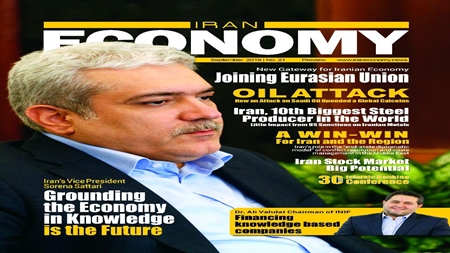
Dr. Sorena Sattari is the Vice President of Science and Technology of the Islamic Republic of Iran. He was born in 1972 to a military family, and he has three younger sisters. His father, Major General Mansour Sattari, was a military commander and served as a commander-in-chief of the Islamic Republic of Iran Air Force. A pilot and radar specialist, General Sattari was martyred in 1993 while commanding in a plane crash with a group of senior military officials in Isfahan. Sorena was 22 years old at the time of his father’s martyrdom. The young Sorena continued his education and earned a bachelor’s degree in mechanical engineering from the Sharif University of Technology in Tehran as the top student. His top ranking got him a scholarship to the University of California, Berkeley, but his father objected to his immigration to the US had him decline the scholarship. He, therefore, continued his education domestically and obtained a doctorate in mechanical engineering from the Sharif University of Technology.
In 2013, after Rouhani’s victory in the presidential election, Sattari was appointed the vice-president for Science and Technology as well as the president of Iran’s National Elites Foundation. He was the youngest member of the cabinet. He is known to stand against a purely oil and crude-based economy in for Iran.
Grounding the Economy in Knowledge is the Future
To learn more about Dr. Sattari and his views about a knowledge-based economy, Iran Economy Magazine conducted an interview with Dr. Sattari. Below is the entire interview with him.
After the new round of US sanctions, is Iran prepared to look into new avenues and markets for scientific cooperation?
We in the Vice-Presidency department look inside the country. In the foreign sector, we are focusing more on the export market than import. There are plenty of import fields, even more than what the country needs. Unfortunately, we are a good importing country with a strong import establishment, both in terms of culture and technology as well as in administration. However, we ought to take heed of the export market.
We are also discussing the return of the elites to the country so that with their help we get to catch up with emerging scientific countries such as China and Russia. These are the set of policies we are focusing on in the infrastructure of our foreign departments. Besides, we are practically coordinators of various agencies. Our work stretches to the whole cabinet and country. So we work with the Ministry of Industry, Mine and Trade, Ministry of Science, Ministry of Education and other ministries and institutions to advance policies.
You’re constantly touring or visiting various projects in cities. If we put our international activities alongside domestic activities such as investment, export, repatriation of elites, and the development of relationships with emerging scientific nations, we will see much work is done in line with the general policy of the state, which is decentralization of infrastructure and activities. What do you say to that?
Our serious debate in the knowledge economy is the foundation of an ecosystem with a proper cultural infrastructure. If you want to transform the economy from natural resources to human resources, you have to start with the ordinary people in the street–ask whether our people respect a man for his money or his knowledge? It starts at this very point, then it moves on to our universities, and then to the other aspects of society. Serious adjustments must be made in our economic structure, the hand of the import mafia should be cut short, and the bureaucratic business climate should be reformed. The government with a large staff will only make the bureaucracy more complicated. All the above requires structural and cultural reform. Thus, based on this need, we established a knowledge-based culture and economic center two years ago along with other strategic technology centers, which are now very active. Its goals mainly gear towards cultural tasks such as content production, discourse and the promotion of the ecological technology and knowledge, and support for Iranian production.
Before I become the vice-president, the science and technology department of press and media was a marginal sector and wasn’t taken seriously, but now with the help of the knowledge-based economy, knowledge economic cultural change has influenced major sections of the media. This has expanded to other areas, such as corporate development, and has assisted the development of knowledge-based companies and the expansion of technology which has become a tool for changing the media culture.
Now, Iranian startups have become a great tool for changing societal tastes and that is what should happen. People have to feel the effect of science and technology in their daily lives to care about it. When a young student sees his classmate launching a new company worth millions of dollars, he, too, will look for a new startup and knowledge company and pursue a new idea. We do not want a university graduate who seeks government employment or admission from a foreign university from day one, but a college student who knows that he will build his life and future around an innovation when he graduates. All of this has to come together to form an overall ecosystem. However, people’s views on these fields differ greatly from four to five years ago, and with this backing, our knowledge-based corporations have already grown to thousands of billions of tomans–IR currency–and they will soon become the country’s largest corporations.
There are lots of criticism of the structures of the traditional economy. You haven’t been shy to raise an objection to the oil-based economy. What has made you so opposed to that sort of economy?
Economies that rely on underground resources are bureaucratic economies with a fragile business climate. Let me put it this way: For a country with 5,000 years of history, rich in science, culture, technology and commercial experiences, it isn’t acceptable to say what we should do if they don’t buy our oil. Just like an employee who thinks he will starve if he loses his job while he is smart and educated. He has missed to realize innovation can transform his life. With this great human resource, we do not need crude sales.
What we lack is an ecosystem of new technology and innovation. In traditional economies, we tend to think everything is possible with money; it creates jobs, brings happiness and much more, and if the country has problems with education, employment or research area, money and access to finance can solve it all. In research, however, human beings are the key element, and if a research is excellent, it will certainly make its own money. In the traditional sense, a research is done in a proper environment with the right tools, i.e. to have a good lab, to have the day-to-day machinery. Such a view is inconsistent with the structures of an innovative economy. Innovation comes out of constraints and has other structure and needs. No wealthy kid becomes an entrepreneur; that’s a fact. No economy that feeds on a cheap resource is dynamic.
When we weren’t sanctioned, we didn’t think about innovation. This could be a solid foundation for the country’s future economy: an economy whose structures embrace innovation, instead of suppressing it. In the oil economy, every innovation and creativity is suppressed, and this is done by the structure itself, not by a minister or an official. When easy oil money comes into the economy, it automatically becomes a powerful tool for repressing and combating creativity. As a result, innovation cannot find a way into this economy.
We’ve been trying to change the ecosystem over the years. As vice president of science and technology traveling to different cities, I’m happy to see the situation change with a new emerging ecosystem.
Is Iran truly experiencing the change in the ecosystem?
Yes, because young people have entered the arena and found their way. But the ecosystem I’m talking about isn’t fully formed yet, and in some parts, this big puzzle has not been completed. For example, young and creative people in small towns still don’t have enough access to private-sector funding.
The private sector needs to be trusted and invested, as well as the government infrastructure that enables young people to settle in growth centers and pursue their activities at a lower cost. These facilities are not much available, but interestingly enough, despite all these shortages, big things are happening. Wherever there are fewer facilities, more innovative and creative ideas grow.
Do you mean an ecosystem is infrastructure plus culture?
Yes, in this ecosystem, if a creative youth has a financial problem somewhere, his family will come to his rescue in a culture that encourages and values entrepreneurship. Let me give you an example. In rich oil provinces, you’ll see a young person aspired to be hired by an Iranian oil company. That’s, however, the drawback. This young man thinks if he is hired, he gets a comfortable job, a paycheck, he will eventually buy a house, a car, and that’s all. Neither he nor his family can think employment will only lower his self-esteem and kill his dreams. Now take this example and look at higher education.
A university, which makes most of its costs through the sale of technology, industrial contracts, and knowledge-based companies, differs from a dependent university that cannot change its back alley. We have made a mistake somewhere in education and need to reform it. We can improve it, because we rank second or third in many human resource standards in the world.
I read the news of Vice-Presidency for Science and Technology posted on a text messaging app every day, but the fact is that even as a follower of news, I sometimes do not understand all of it. As you have mentioned, there is news wave, but there is still no interesting and sometimes understandable content for such a wave. Still, many people wonder what a science and technology park or knowledge-based company is. Where is the problem: the media or the media power source?
What you are saying is true, but it takes time. A while ago, in one of the production programs of the Center for Cultural Economics of Knowledge-based, a few questions were raised in a poll with the people, which had an interesting result. For example, they asked about the Science and Technology Park and many said it should look like a city park. But things are getting better. Now many are talking about these phenomena that people are familiar with. Technology is expanding its culture and understanding of its use. The real argument, however, is that we can now use technology on internal applications. We find that in these areas many young people are competing side-by-side with foreign companies.
What is the latest on domestically produced drugs, and how soon Iran can become independent from other countries in drug production?
Fortunately, in medicine, good things have happened over the years, and we have been able to emerge as one of the key players in biotechnology. We produce about 97 percent of our medicines domestically, and since last year we have set a serious plan to produce the remaining three percent. We have about $700 million worth of imported raw materials for drugs. We have planned to cut our total dependence on imports. I think in the next three years the problem of drugs will be solved, but in some areas such as food processing we face a faulty cycle that calls for much more improvement.
Please elaborate on that?
Let me just say that when we talk about the knowledge-based economy, we talk about the Knowledge Value Added. For example, you buy a bottle of 100ml perfume overseas at $100, while you sell 154 liters of crude oil for $50. That means you replace 3,000 jars of oil with a jar of perfume. This is while the ingredients that make a fragrance are not very pricey.
Two or three weeks ago I visited a knowledge-based company in Chalous City where seven young people were working. The company’s input was cow bones, which is not as nearly expensive as the raw material for perfume, but its output is a powder that sells every six-tenths of a gram for 350,000 tomans (IR money) for a tooth implant that’s more expensive than gold.
This is a great example of the power of knowledge. The rocket itself is nothing than metal, but the power of knowledge transforms it into a multi-million-dollar missile or aircraft. This is also the case in the food industry. We have been seriously involved in food science for over a year now, and we have encouraged many companies to work in this field. For instance, we have encouraged human biotech companies to work on livestock, poultry, and aquaculture, which are simpler than the human issues. There has been work in agriculture as well as high-tech companies, all of which will soon be tangible. It’s not important what military weapons we have if we can’t provide food for the country. This priority applies not just to us but to other countries too.
When easy oil money comes into the economy, it becomes a powerful tool for repressing and combating creativity. As a result, effort based on brains cannot find a way into this economy
SATTARI



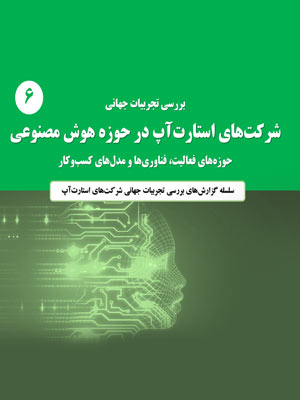



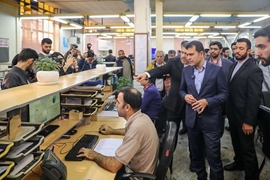
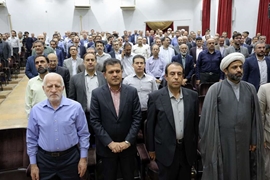
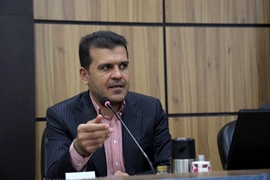
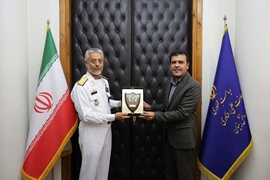

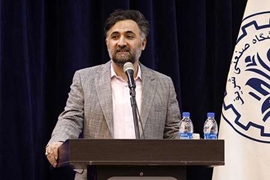
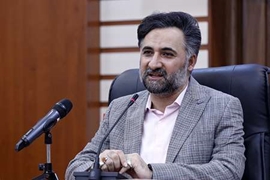
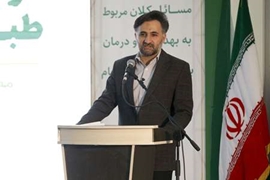
comment